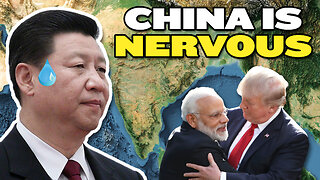Premium Only Content

Principles of Economics by Carl Menger Chapter 5.3B - Price Formation by Competing Sellers
You want to read the book? Get it here: https://amzn.to/4cCPIQs
Watch the next video in this series: https://rumble.com/v6unurp-principles-of-economics-by-carl-menger-chapter-5.3c-competition-policy.html
Watch the video series from the start: https://rumble.com/playlists/I48mBTB4w2c
Watch our video about Carl Menger: https://rumble.com/v61z0l2-carl-menger-the-father-of-austrian-economics-and-subjective-value.html
What really determines the final price of goods in a market—the number of sellers or the quantity offered? In this video, we break down Carl Menger’s Principles of Economics, Section 5.3B: The Effect of Offered Quantities and Fixed Prices on Market Outcomes.
Using the familiar example of farmers trading grain for horses, Menger shows how both monopoly and competitive markets follow the same core rules: the final price and distribution of goods depend not on how many sellers there are, but on how much of the good is available and the price being asked.
If multiple sellers offer more horses, prices fall and more buyers can participate. If fewer horses are offered, prices rise and only top buyers can afford them. This matches what happens in a monopoly market where only one seller exists. In both cases, what matters is the total quantity and the buyers’ willingness to pay—not whether there’s one supplier or many.
Likewise, when prices are fixed instead of negotiated, the same principle holds: higher prices reduce total sales and exclude more buyers; lower prices increase both. Again, it doesn’t matter if one or many sellers set the price—the outcome is the same.
This chapter shows that competition doesn’t override basic economic laws. Whether in a monopoly or a crowded market, supply quantity and price levels are what determine the real economic results.
❓ Questions This Video Answers:
-What determines the final price in a competitive market?
-Do more sellers automatically lower prices?
-How does the total quantity offered affect buyers?
-Does competition change how goods are distributed?
-What happens when prices are fixed?
-Do fixed prices behave differently under monopoly or competition?
-Why is buyer willingness to pay important?
-How are goods shared among buyers when supply increases?
-Is the number of sellers or total supply more important?
-Do monopoly and competition follow the same pricing rules?
00:00 - Introduction into Competing Sellers and Price Formation
00:19 - Multiple Sellers and Price Impact
00:49 - Two Sellers Example
01:26 - Comparison with Monopoly
01:49 - Fixed Prices Scenario
02:13 - Summary of Principles
02:36 - Outro
#PriceFormation #SupplyAndDemand #CarlMenger
-
 LIVE
LIVE
Lofi Girl
2 years agoSynthwave Radio 🌌 - beats to chill/game to
217 watching -
 7:40
7:40
Blabbering Collector
15 hours agoLEAKED: Draco Malfoy, Hooch, Neville Longbottom! | Harry Potter HBO Show Update, Wizarding News
25.2K2 -
 3:06:35
3:06:35
Badlands Media
18 hours agoDEFCON ZERQ Ep. 017: Tesla Tech, Ancient Power & The Fight for Human Consciousness
245K66 -
 3:11:56
3:11:56
TimcastIRL
10 hours agoDOJ Launches FULL INVESTIGATION Into TPUSA Antifa RIOT, Media Says Mostly Peaceful | Timcast IRL
276K111 -
 3:16:27
3:16:27
Barry Cunningham
14 hours agoBREAKING NEWS: SOLVING THE HOUSING CRISIS BY UNDERSTANDING VETERANS DAY! AND IT'S MOVIE NIGHT!
90.3K35 -
 8:58:17
8:58:17
SpartakusLIVE
12 hours agoWZ Solos to Start || NEW Battlefield 6 - REDSEC Update Later
31.9K1 -
 1:01:56
1:01:56
ThisIsDeLaCruz
20 hours ago $14.29 earnedInside Kenny Chesney’s Sphere Part 1: Exclusive Backstage Pass
44.2K2 -
 2:09:50
2:09:50
DLDAfterDark
10 hours ago $5.23 earnedA Complete Look Into The Glock "V Series"! Pistol In Hand! VERY GAY!!
27K2 -
 7:42
7:42
China Uncensored
17 hours agoIndia Has Surpassed China
52K22 -
 8:47
8:47
Hollywood Exposed
15 hours agoJoe Rogan and Zachary Levi DESTROY Gavin Newsom’s Lies About California
32.8K7